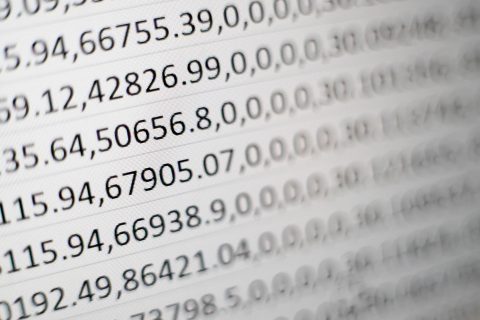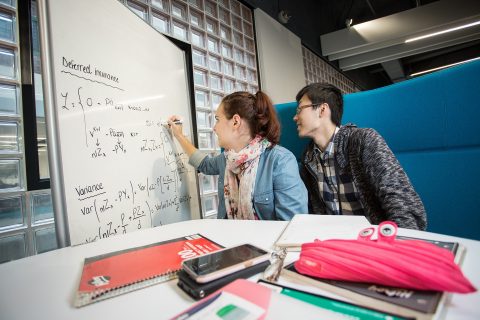Mathematics and Statistics (BA, BSc)
Virtual information sessions
Discover what makes Concordia's Faculty of Arts and Science stand out as a leader in the humanities and social and natural sciences, including academic opportunities, hands-on learning and how to achieve your goals.
Why study Mathematics and Statistics?
Mathematics is a language that answers real-world questions in science and engineering. Statistics is the science of information. Studying them together gives you a set of tools which will allow you to explore the meaning behind the numbers in a range of practical applications.
This program is designed for students who wish to enter the job market right after graduation. As a Mathematics and Statistics student, you’ll uncover the mathematical structure of random systems such as the economy and the stock market, health and survival, and weather forecasting. You will build a solid foundation in linear algebra, calculus, probability and number theory, and learn to use professional software tools for mathematics and data analysis applications.
If you choose the Joint Major in Computer Science – Mathematics and Statistics, you’ll complement your mathematics knowledge with computer science topics such as modelling and symbolic computation. It’s also common for Mathematics and Statistics students to add a minor in a different field of their choice.
After you graduate with a Major in Mathematics and Statistics, you will have the knowledge and skills required to apply mathematics and statistics in professional careers in business, industry or government agencies.
Special funding for out-of-province students
Up to $4000 for undergraduate programs.
Program structure
A Bachelor of Arts or Science degree takes a minimum of three or four years (90 – 120 credits) of full-time study, depending on your academic background.
Program options
- Major in Mathematics and Statistics (42 credits)
- Major in Data Science (72 credits)
- Minor in Mathematics and Statistics (24 credits)
About the Major
The Major in Mathematics & Statistics is a 42-credit program with a common core of 36 credits. It is aimed at students who would like to have a good background in the mathematical sciences, but whose goals are to enter the job market upon graduation, rather than to pursue graduate studies. The focus of the Major is on the applicable nature of the mathematical sciences as tools for solving, and as ways of thinking about, a wide range of problems. Certain selected topics will be covered in each course accompanied by the use of appropriate software applications.
Courses
Admission criteria
Minimum cut-off averages and course requirements
- Quebec CEGEP: DEC, 20 math
- Natural Science DEC or
- DEC intégré en sciences, lettres et arts or
- Linear Algebra; Calculus 1 & 2; Mechanics, Electricity and Magnetism; Waves, Optics and Modern Physics; General Chemistry; Chemistry of Solutions and General Biology
- Additional information for CEGEP applicants
- High School: C+ overall, C+ math and science
- Canadian curricula course requirements
- Accepted international qualifications
- One math from Pre-Calculus, Calculus, or equivalent
- Two sciences (from Biology, Chemistry or Physics)
- ACT or SAT is not required
- AP exams are not required but may qualify you for advanced standing
- International Baccalaureate (IB) diploma: 26 overall, 4 math and science
- one math (Applications and Interpretations HL, Analysis and Approaches HL or Analysis and Approaches SL)
- one science (Physics, Chemistry or Biology, either SL or HL)
- one of the math or science courses must be completed at the HL level
- International Baccalaureate Career-related Programme (CP): 26 overall, 4 math and science
- Same as International Baccalaureate Diploma Programme (DP) requirements
- Additional Career-related Programme (CP) course requirements
- Baccalauréat français: 11 overall, 11 math and science
- Première: Spécialité mathématiques and Spécialité physique-chimie
- Terminale: Spécialité mathématiques (also accepted, Spécialité Physique-Chimie and Mathématiques Complémentaires)
- Additional information for Baccalauréat français applicants
- British system of education (GCE):
- A-levels: At least two A-level exams CD, C in math, C in science or
- AS-levels: At least 4 AS-level exams with equivalent results or
- BTEC: Level 3 Diploma or Extended Diploma in a related subject area with equivalent results
- Students without math or science A-levels may be admissible based on AS-level or iGCSE/GCSE/O-Level exam results. Students should include all their exam results from iGCSE (or equivalent) onwards to support their application.
- Additional information for British System of Education (GCE) applicants
- University Transfers (internal/external): C overall, C math and science
- Courses in the disciplines of Calculus, Linear Algebra, Biology, Chemistry and Physics
Minimum cut-off averages should be used as indicators. The cut-off data may change depending on the applicant pool. Applicants who meet the stated minimum requirements are not guaranteed admission to these programs.
Minimum cut-off averages and course requirements
- Quebec CEGEP: DEC, 20 math
- Linear Algebra; Calculus 1 & 2
- Additional information for CEGEP applicants
- High School: C+ overall, C+ math
- Canadian curricula course requirements
- Accepted international qualifications
- One math from Pre-Calculus, Calculus, or equivalent
- ACT or SAT is not required
- AP exams are not required but may you qualify for advanced standing
- International Baccalaureate (IB) diploma: 26 overall, 4 math
- one math (Applications and Interpretations HL, Analysis and Approaches HL or Analysis and Approaches SL)
- International Baccalaureate Career-related Programme (CP): 26 overall, 4 math
- Baccalauréat français: 11 overall, 11 math
- Première: Spécialité mathématiques
- Additional information for Baccalauréat français applicants
- British system of education (GCE):
- A-levels: At least two A-level exams CD, D in math or
- AS-levels: At least 4 AS-level exams with equivalent results or
- BTEC: Level 3 Diploma or Extended Diploma in a related subject area with equivalent results
- Students without a math A-level may be admissible based on AS-level or iGCSE/GCSE/O-Level exam results. Students should include all their exam results from iGCSE (or equivalent) onwards to support their application.
- Additional information for British System of Education (GCE) applicants
- University Transfers (internal/external): C overall, C math
- Courses in the disciplines of Calculus and Linear Algebra
Minimum cut-off averages should be used as indicators. The cut-off data may change depending on the applicant pool. Applicants who meet the stated minimum requirements are not guaranteed admission to these programs.
Application deadlines
It’s not too late to apply
Most undergraduate programs are still accepting applications for fall 2025.

FALL ENTRY (September)
Deadline: March 1
International applicants: Apply no later than February 1 to allow time for immigration document processing. However, applying earlier is strongly recommended. Immigration processing times vary by country, and delays could prevent you from starting your studies on time.

WINTER ENTRY (January)
Deadline: November 1
International applicants: Apply no later than August 1 to allow time for immigration document processing. However, applying earlier is strongly recommended. Immigration processing times vary by country, and delays could prevent you from starting your studies on time.
We reserve the right to close admission to a program at any time after the official deadline without prior notice.
Funding note
Quebec residents who enroll in certain programs and meet the eligibility criteria may apply for funding of $2,500 per term through the Quebec Perspective Bursary (Bourse Perspective Quebec).
United States students: A U.S. Federal Student Aid-eligible version of this program is offered. This version meets all U.S. regulations (such as no co-operative education or e-courses) for eligible programs.
After your degree
Mathematics and Statistics alumni have established careers in areas such as:
- Biostatistics
- Data analysis
- Government agencies
- Management/statistical consulting
- Polling agencies
- Scientific research
- Survey analysis
- Software development
Student stories

Scarlet Guy
Bachelor of Arts Honours History: Public History
Find out how Scarlet Guy discovers a world of interdisciplinary learning and community support in the Faculty of Arts and Science.
Other programs of interest

If you want to learn how to predict the future, consider actuarial mathematics. Actuaries use their mathematical and statistical wizardry to solve problems involving risk and uncertainty.
Department
Department of Mathematics & Statistics
Faculty

Model the future, solve problems involving risk, and make financial decisions that will affect the futures of corporations, communities and investors. This combined program offers you a direct path to an actuarial career with a financial sector specialization.
Department
Department of Mathematics & Statistics
Faculty

If you’re a problem solver, have great math skills and a keen interest in financial markets, Mathematical and Computational Finance is the field where these skills and interests intersect.
Department
Department of Mathematics & Statistics
Faculty


